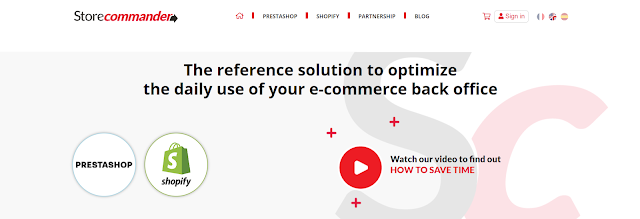Store Commander: an effective solution to optimize the SEO of your online store
Store Commander is a solution that allows e-retailers to manage the catalog of their online store. It has been used by more than 40,000 stores since its creation. This module has many advantages both in terms of productivity and SEO management.
In this article, we explain what Store Commander is and why this module is so beneficial for the SEO of your website.
Store Commander: the module that saves time and efficiency
Store Commander, it is a module dedicated to e-commerce sites Prestashop and Shopify. The main objective of this solution is the mass management of products presented on an e-commerce site by adding an additional layer of functionality to the native functions of your CMS.
Store Commander offers better management of the product catalog thanks to a data management system, stocks, promotions, prices, suppliers, delivery, but also natural referencing.
E-retailers can also manage access to the module and fully customize their dashboard to facilitate their internal management.
The daily management of products presented on an e-commerce site can be extremely time-consuming. Store Commander helps reduce the time spent enriching the product catalog: data can be updated in bulk and in just a few clicks.
What Store Commander seeks to offer e-retailers is to devote more time to the performance of their site and the growth of their sales.
In addition, the Store Commander teams regularly carry out updates based on feedback from their customers.
The benefits of Store Commander for SEO
Natural referencing – or SEO – is essential to give visibility to a commercial site. The objective of SEO is in fact to facilitate the indexing of the contents of a site by search engine robots (Google in particular) and therefore to make the site as readable as possible.
In SEO terms, Store Commander has 4 major advantages in the technical and semantic optimization of the site.
1. Mass allocation of tags
Thanks to Store Commander, it is possible to enter product title tags and image captions automatically. This mass management system saves a lot of time, especially when the catalog is very extensive.
2. Highlighting non-optimized meta Title and meta Description tags
The Title tag as well as the meta Description must respect a maximum number of characters so that all of the text is correctly displayed in the search results. A title tag of more than 60 characters cannot be displayed in full, the Internet user therefore does not have access to the entire title of the page: this can hurt the click incentive. As for Google, it cannot take into account all of the words included in the title tag. Via Store Commander, at a glance and thanks to a color code, it is possible to check the number of characters in the title tags and meta description. Reading by search engines is therefore optimized.
3. Managing duplicate tags
Duplicate title tags and meta descriptions create what is called duplicate content. However, duplicate content can hurt your SEO: the two pages in fact compete with each other because they are not considered unique by Google robots.
The Store Commander module highlights duplicates so that the e-retailer can export the data to CSV, correct it, and re-import the optimized tags.
4. Image Optimization
The weight of images on a site has a direct impact on loading speed. However, the speed and accessibility score of a site can be negative if the images are too heavy and the pages take time to load. However, compressing images can be tedious!
Store Commander therefore offers a diagnosis of the weight of the images, then an automatic reduction of all images considered too large. The module also offers a clear view with a percentage indication of the gain obtained after compression.
Store Commander is a tool that allows you to increase productivity and efficiency!
This module can be recommended in particular to e-retailers who manage an extensive product catalog.
Finally, please note that Store Commander offers comprehensive training to help you get started with the module.


Comments
Post a Comment